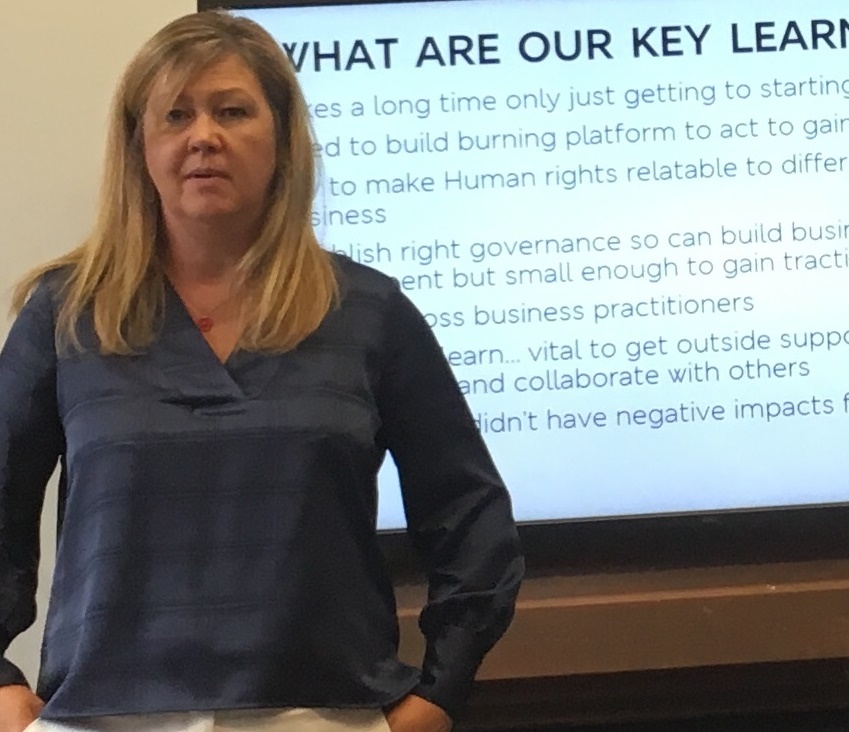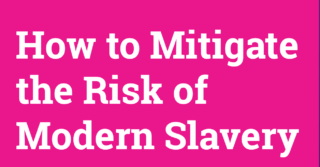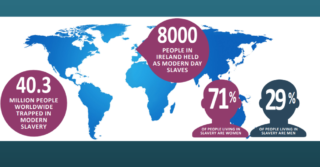Marks & Spencer, Sustainable Procurement & Human Rights
On September 19, our Senior CSR and Sustainability Adviser Darina Eades attended a meeting of the Northern Ireland Business & Human Rights Forum, hosted by Queen’s University in Riddell Hall, Belfast.
 The meeting featured a talk by Louise Nicholls, the Corporate Head of Human Rights, Food Sustainability & Food Packaging with Marks & Spencer. For organisations who are serious about trying to make their procurement practices more sustainable (e.g. in the sourcing of uniforms and T-Shirts worn by staff and other personnel), what Louise had to say about the sourcing of sustainable cotton will be of interest. Louise covered a range of aspects, not least that 77% of the cotton used by Marks & Spencer (both in their clothing and home products) is sourced sustainably and that this figure will increase to 100% in April 2019.
The meeting featured a talk by Louise Nicholls, the Corporate Head of Human Rights, Food Sustainability & Food Packaging with Marks & Spencer. For organisations who are serious about trying to make their procurement practices more sustainable (e.g. in the sourcing of uniforms and T-Shirts worn by staff and other personnel), what Louise had to say about the sourcing of sustainable cotton will be of interest. Louise covered a range of aspects, not least that 77% of the cotton used by Marks & Spencer (both in their clothing and home products) is sourced sustainably and that this figure will increase to 100% in April 2019.
Few people know that it can take between 10,000 and 20,000 litres of water to produce just 1 kg of cotton (depending on where it’s grown). Cultivation of cotton can also be highly chemical intensive, where unsafe use of chemicals can cause severe health impacts, both on workers in the field and on surrounding eco-systems. While a number of initiatives have been developed globally to improve the sustainability of cotton production, sustainable cotton is only estimated to be at 15% of global production. Which puts in context the considerable efforts M&S is making, and the stringent target they have set themselves.
M&S uses 50,000 tonnes of lint cotton every year and the fibre they use comes from India, China, Pakistan, Turkey, Brazil, USA, Africa and Australia. Louise says that taking an active approach to sourcing cotton sustainably (as they have been doing since 2007) makes business sense as it will secure M&S access to this vital raw material for years to come. Sustainable cotton is cultivated using the least amount of water, only a limited amount of pesticide and synthetic fertiliser, and (crucially) where the economic sustainability of farmers, and the social conditions in which they live, are supported. To achieve their goals to source cotton sustainably, M&S is collaborating with a wide range of multi-stakeholder and industry platforms.
For details on all of this, please see: https://corporate.marksandspencer.com/plan-a/clothing-and-home/product-standards/raw-materials-commodities/cotton
Marks & Spencer joined the Ethical Trade Initiative in 1998 as a Founder Member and the company began to delve deeply into all aspects of their supply chain at that point. Louise says that it has been interesting to note that it has taken the 2013 Rana Plaza disaster in Bangladesh and the expose of the fishing industry in Thailand to bring human rights issues to the forefront for consumers.
Unfortunately, we don’t have to go overseas and to far-flung locations to uncover human rights infringements. These are happening in the operations and supply chains of companies in Ireland, just as much as they are anywhere else. Most at risk are sub-contractors, in facilities management (e.g. cleaning, security, catering and food) and in construction.
One of the facts disclosed by Louise Nicholls is that, in the UK in 2017, 25% of reported victims of modern slavery were working in car washes.
We know that human rights infringements are on the rise globally. We have talked about the issues before but they are worth repeating here. They include excessive working hours; the under-payment of wages; the non-payment of overtime; the non-payment of social insurance; and poor health & safety. Migrant workers and refugees are particularly vulnerable, and this worrying because more mass migration took place in 2017 than in any other previous year.
It is estimated that over 40 million people are trapped in some kind of modern slavery (2016 Global Slavery Index), 71% of which are female. Trafficking is the fastest growing form of international crime & the 3rd largest criminal industry after drugs & arms trafficking.
It was very welcome that Louise Nicholls was vocal about the use of M&S of the UN Guiding Principles on Business & Human Rights where businesses have a duty to protect, respect and remedy situations when they find them. Her key recommendations were in line with what BITCI has been advocating for some time:
1) Map the company’s supply chain to be clear on what goods are being procured from where.
2) It’s important to do thorough checks on all documentation suppliers say they have and conduct on-site visits where possible, so as to have direct access to the people working there.
3) If an issue is found, take swift action to address it.
Legislation such as the California Transparency in Supply Chains Act and the UK Modern Slavery Act (and other legislation in India, France & soon to be enacted in Australia) are all supporting the move of companies globally to examine their human rights impacts, both in their own operations and their supply chain, to consider what changes they have to make to ensure no infringements are taking place.
M&S has taken a global leadership role in how they are addressing Modern Slavery. They are particularly looking at In-Work Poverty & the Living Wage; and focusing on increasing transparency with their excellent M&S Supplier Map.
According to Patricia Carrier of the Business & Human Rights Resource Centre (the UK organisation that analyses the Modern Slavery Statements and who spoke at a meeting of the Northern Ireland Business & Human Rights Commission last year), only a handful of companies are reporting well on human rights. Marks & Spencer is one of these. M&S is:
1) explicit about what they are sourcing, from what supplier & its location
2) they have a strong risk identification process
3) they are disclosing their risks and instances of non-compliance, in operations and the supply chain, and are disclosing how they are taking remedial action.
Business in the Community Ireland – Advice & Guidance on Business & Human Rights
BITCI delivers training on sustainable procurement and human rights for personnel in procurement, cross-functional teams, suppliers, senior management and the board.
For more information on training, policy development and human rights risk assessment, please contact Darina Eades, Senior CSR & Sustainability Adviser, Business in the Community Ireland at deades@bitc.ie
Additional Resources
The UN Guiding Principles on Business & Human Rights Reporting Framework.
https://www.ungpreporting.org/
The Approach of M&S to Human Rights & Modern Slavery
https://corporate.marksandspencer.com/plan-a/business-wide/human-rights
The M&S Supplier Map, where you can view the list of M&S Suppliers by type (e.g. Clothing, Home, Beauty & Food) and location in the world (e.g. the street address, how many each supplier employs, what the gender ratio is and if they have union representation). The Map features 68 countries, 1871 factories, over 1 million workers. Search first by country and then by supplier. https://interactivemap.marksandspencer.com/
The M&S Modern Slavery Statement 2018
This is worth reading on account of the detail conveyed – impressive re the leadership position taken. https://corporate.marksandspencer.com/documents/plan-a-our-approach/mns-modern-slavery-statement-june2018.pdf
The M&S Modern Slavery Toolkit for Suppliers & Partners
This resource is filled with excellent tips for organisations of all sizes.
https://corporate.marksandspencer.com/documents/plan-a-our-approach/mns-modern-slavery-toolkit.pdf
A note on the Modern Slavery Reporting App in the UK
https://www.edie.net/news/7/BT-teams-up-with-Unseen-to-launch-modern-slavery-reporting-app/







